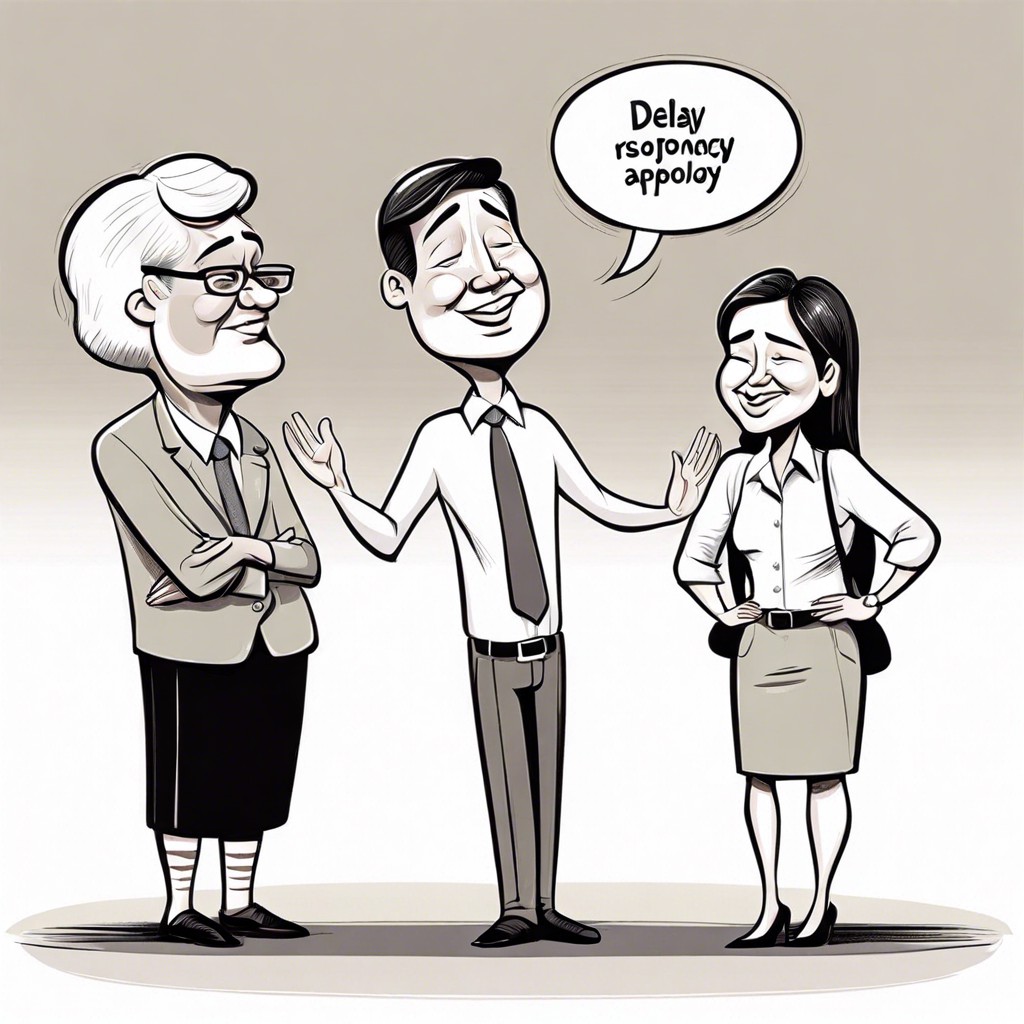Discover respectful and witty ways to respond to “sorry for the delay” in emails or messages.
Ever found yourself staring at your inbox, wondering how to respond to that “Sorry for the delay” email without sounding sarcastic or annoyed? Fear not! We’ve got you covered with a treasure trove of responses that say “It’s cool, I’ve got all the patience in the world” in various friendly and professional ways. Dive in, and let’s master the fine art of graciously accepting apologies for life’s little holdups.
Key takeaways:
- Acknowledge delays with empathy and gratitude.
- Show understanding and patience for delays.
- Foster positive relationships with relaxed responses.
- Encourage open communication with forgiving replies.
- Value updates and appreciate efforts made.
“No Worries At All!”

Sometimes life gets in the way, and delays are inevitable. A breezy, reassuring response can ease any guilt the other person might feel. When someone says “Sorry for the delay,” responding with a light-hearted phrase communicates several things:
It shows empathy. You’re acknowledging that delays happen to everyone, making them feel less stressed about it.
It keeps the conversation positive. Rather than dwelling on the wait, you’re shifting focus to the fact that they did get back to you.
It maintains a friendly tone. By being easy-going, you foster a more relaxed and cooperative relationship.
Plus, who doesn’t like a bit of drama-free communication?
“Thanks for Getting Back to Me.”
When someone says they’re sorry for the delay, showing gratitude for their response keeps things positive. It acknowledges their efforts and moves the conversation forward smoothly.
Firstly, it validates their response. Everyone likes to feel appreciated.
Secondly, it maintains a friendly tone, vital for keeping professional and personal relationships healthy. Remember that people have their reasons for delays.
Lastly, it subtly encourages prompt communication in the future without sounding pushy.
In a nutshell, it’s a perfect blend of politeness and practicality. Now, how’s that for a win-win?
“I Completely Understand!”
Acknowledging someone’s delay with empathy communicates your understanding and patience. It’s a gentle way to show you’re on their side.
Stress creeps into our lives, making delays inevitable. Recognizing this human element builds rapport.
People often juggle multiple tasks. Your understanding response offers them a moment of relief.
A delay might arise from unforeseen events. Letting them know it’s okay eases their worry.
Besides, today’s world is full of distractions. A little empathy goes a long way.
So, next time you get a delayed response, remember: kindness and patience are timeless virtues. Keep it cool, understand, and share a smile.
“No Problem, Take Your Time.”
When someone apologizes for a delay, saying “No problem, take your time” can work wonders. This phrase shows patience and understanding. Here’s why it’s a winner:
First, it takes the pressure off. The person may already feel guilty or stressed. Offering them more time can reduce their anxiety and make them work more effectively.
Second, it shows empathy. Everyone’s caught in the whirlwind of life, and acknowledging that makes you relatable. It strengthens relationships and builds trust.
Lastly, it’s flexible. It leaves room for both parties to renegotiate timelines calmly, ensuring quality isn’t compromised for speed.
In essence, adding a touch of patience and understanding can turn a small hiccup into a bonding moment.
“These Things Happen!”
Sometimes life throws curveballs, and delays are inevitable. It’s all part of the game. When you acknowledge this, everyone breathes a little easier.
First, accepting delays shows empathy. You’re recognizing that we’re all human, subject to external factors.
Second, it underscores your flexibility. Being adaptable is a stellar trait in both personal and professional realms.
Lastly, it fosters a positive rapport. Understanding responses strengthen relationships more than frustration ever could.
So, remember: a little understanding goes a long way.
“Appreciate the Update!”
Sometimes, acknowledging the delay with gratitude can be a game-changer. It shows patience and appreciation, which fosters goodwill.
Thank them sincerely. This can ease any guilt they might feel and makes the interaction positive.
Always good to point out that updates are valuable. Even belated information helps to keep you in the loop.
Show empathy. Everyone gets busy, and your gratitude reflects understanding.
Lastly, emphasizing the usefulness of the update ensures the person knows their effort wasn’t in vain.
In short, a little gratitude goes a long way. It’s like sprinkling kindness confetti.
“Not a Big Deal, Don’t Sweat It!”
Sometimes life throws you curveballs, and deadlines slip through our fingers like sand. When someone’s apologizing for a delay, a relaxed and forgiving response can go a long way. Here’s why it’s not a big deal:
Stress Relief: Both parties can take a collective sigh of relief when the air is cleared with a friendly “no sweat” vibe. Less tension, more smiles.
Showing Empathy: Recognizing that delays happen humanizes the interaction. You’re both people with busy lives, not robots punching clocks.
Building Trust: A calm response cultivates goodwill. It signals that the relationship is more important than rigid timelines.
Encouraging Communication: A laid-back reaction can prompt more open, honest communication. People are more likely to reach out if they’re not fearing judgment.
Less Pressure: For future interactions, this approach reduces the pressure to be perfect. Lower anxiety levels mean smoother workflows and better collaboration.
This mindset not only fosters a positive dialogue but can also transform mundane transactions into meaningful connections. Plus, you’re basically saving the world one kind phrase at a time. Talk about hero status!
“All Good, Thanks for the Follow-up.”
It’s reassuring to hear back, even if it took a while. “All good, thanks for the follow-up” conveys your acknowledgment and appreciation for the other person’s effort to keep you in the loop. Here are some ideas to enhance this response:
- It shows empathy. Addressing the delay shows you understand that life happens and you’re not holding a grudge.
- Maintains professionalism. It’s polite, keeps the communication smooth, and shows you value the relationship.
- Encourages continued communication. By thanking them, you create a positive loop, making them more likely to keep you informed in the future.
So next time someone says “sorry for the delay,” use this response to keep things positive and productive.
“Understandable, Life Gets Busy!”
Ever feel like you’re juggling flaming torches while riding a unicycle on a tightrope? That’s life. It’s unpredictable and chaotic. People are dealing with more than they let on, from work deadlines to family shenanigans.
Cutting someone some slack isn’t just a kind gesture; it’s a recognition of humanity. We’ve all been there. Job pressures, unexpected emergencies, or that mysterious black hole where all our time disappears. When someone apologizes for a delay, acknowledging that chaos can diffuse tension and build rapport.
Plus, let’s be real: perfection is overrated. Show a little empathy. Who knows? You might need that same grace extended to you someday.
And hey, life’s a circus. You just gotta roll with it and enjoy the show.
“Thanks, I Was Able to Manage in the Meanwhile.”
Ever hear “sorry for the delay” and think, “Well, thanks for playing hide and seek with my patience?” Instead of venting that frustration, why not show a bit of grace?
For starters, acknowledge any progress you’ve made without them. This highlights your resourcefulness and keeps the conversation positive. Plus, who doesn’t want to come off as self-sufficient?
Next, express relief. Showing that you managed indicates maturity and avoids unnecessary guilt-trips. It’s like telling them, “I’ve got this, but hey, nice to see you!”
Finally, slip in a small update. This can be a great way to segue into what needs to happen next without making them feel bad for being MIA. Think of it as your smooth recovery play.
Consider it a gentle reminder that while you prefer punctuality, you’re not losing sleep over it.




